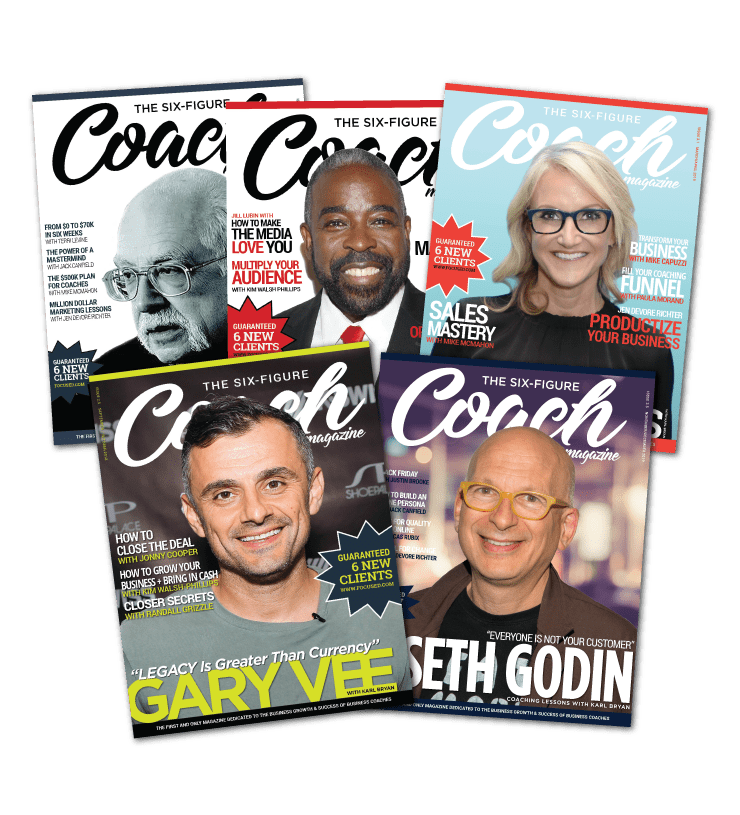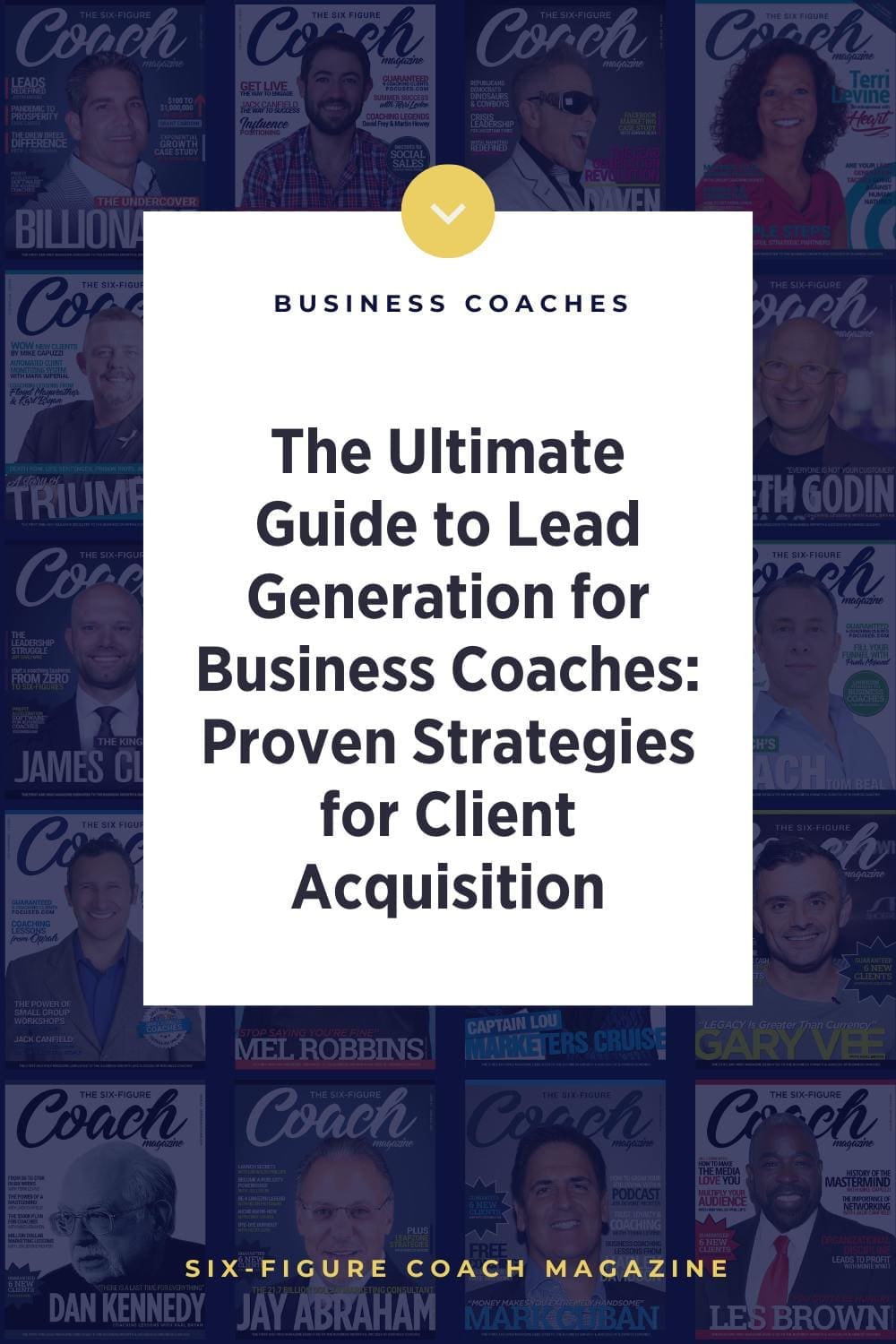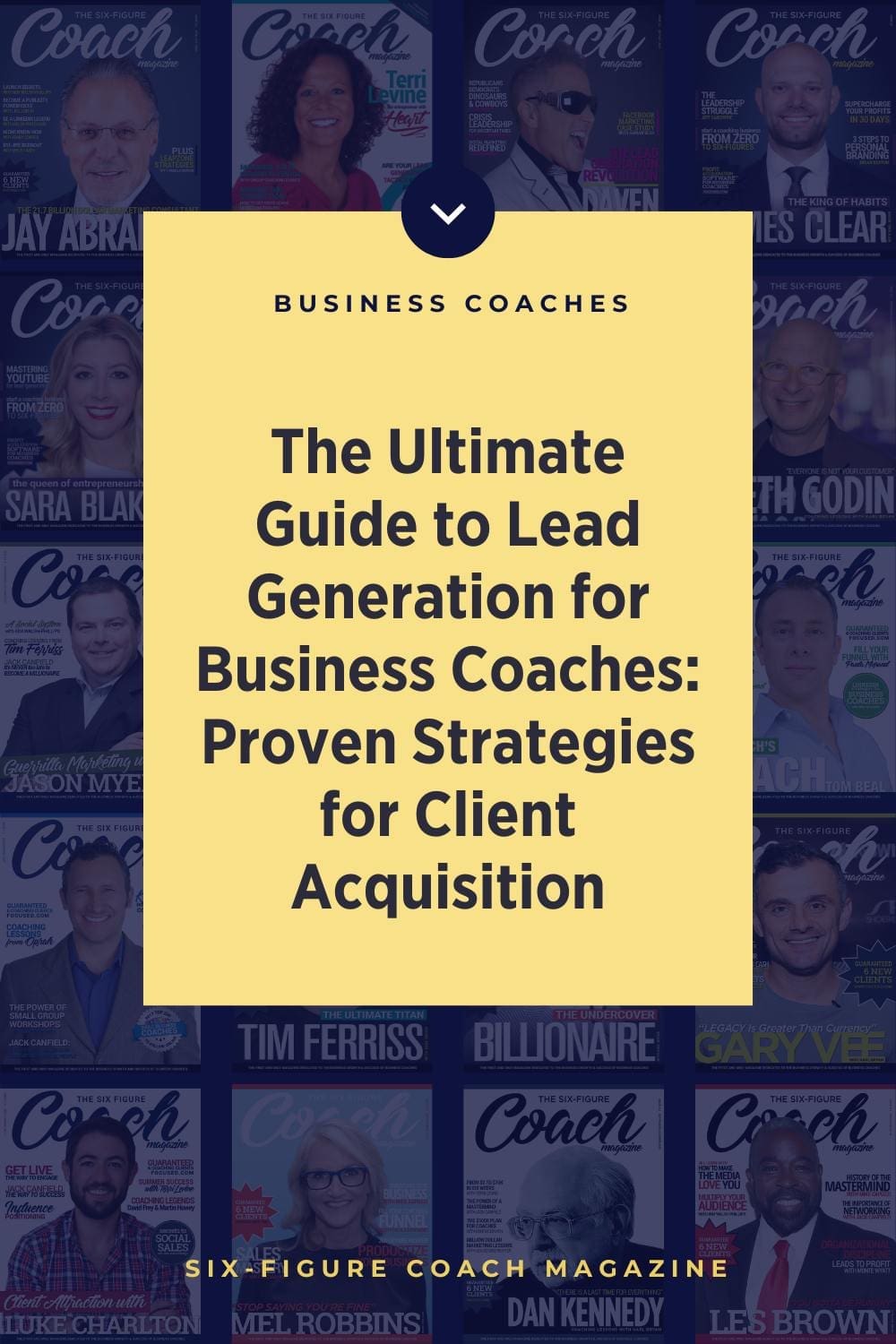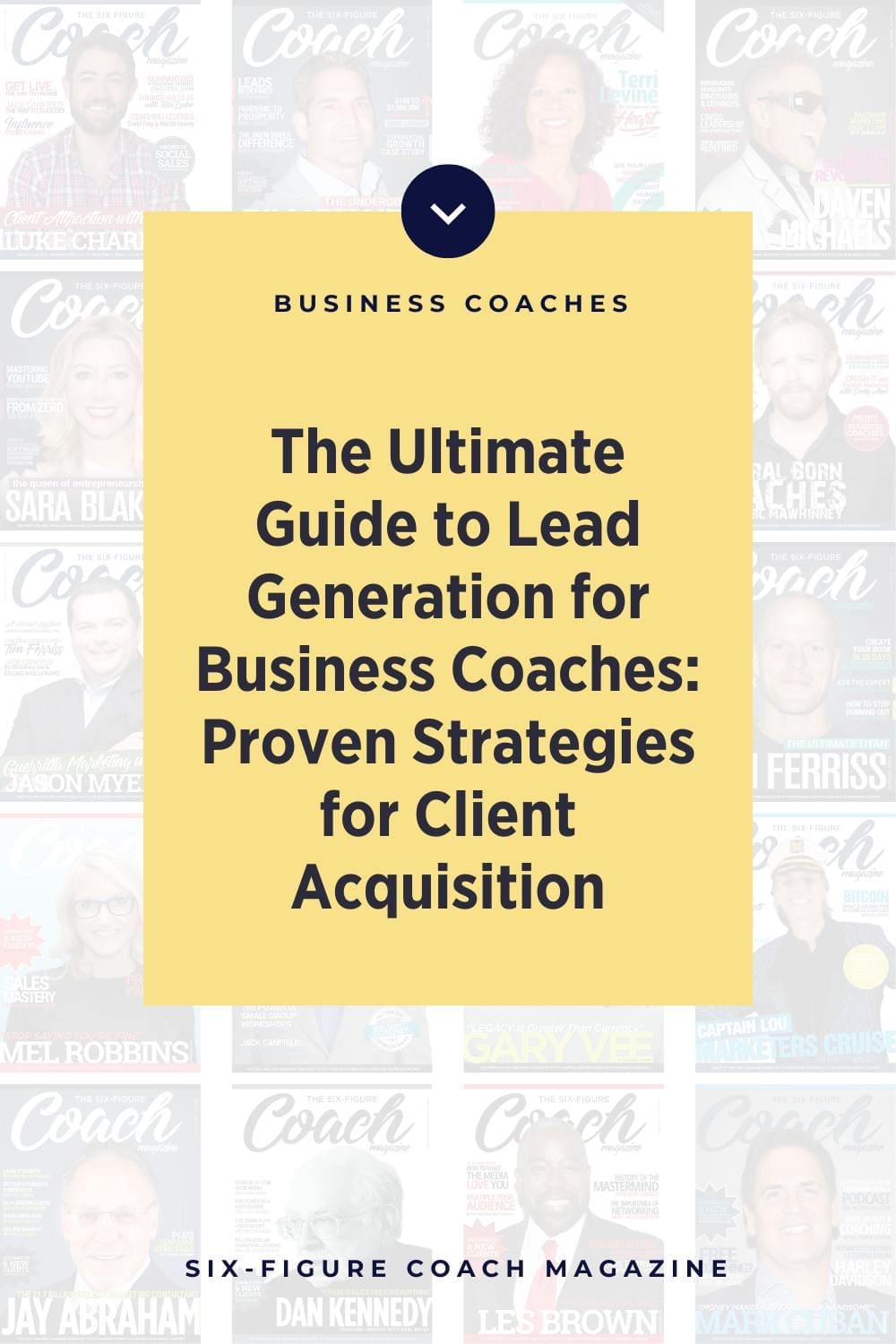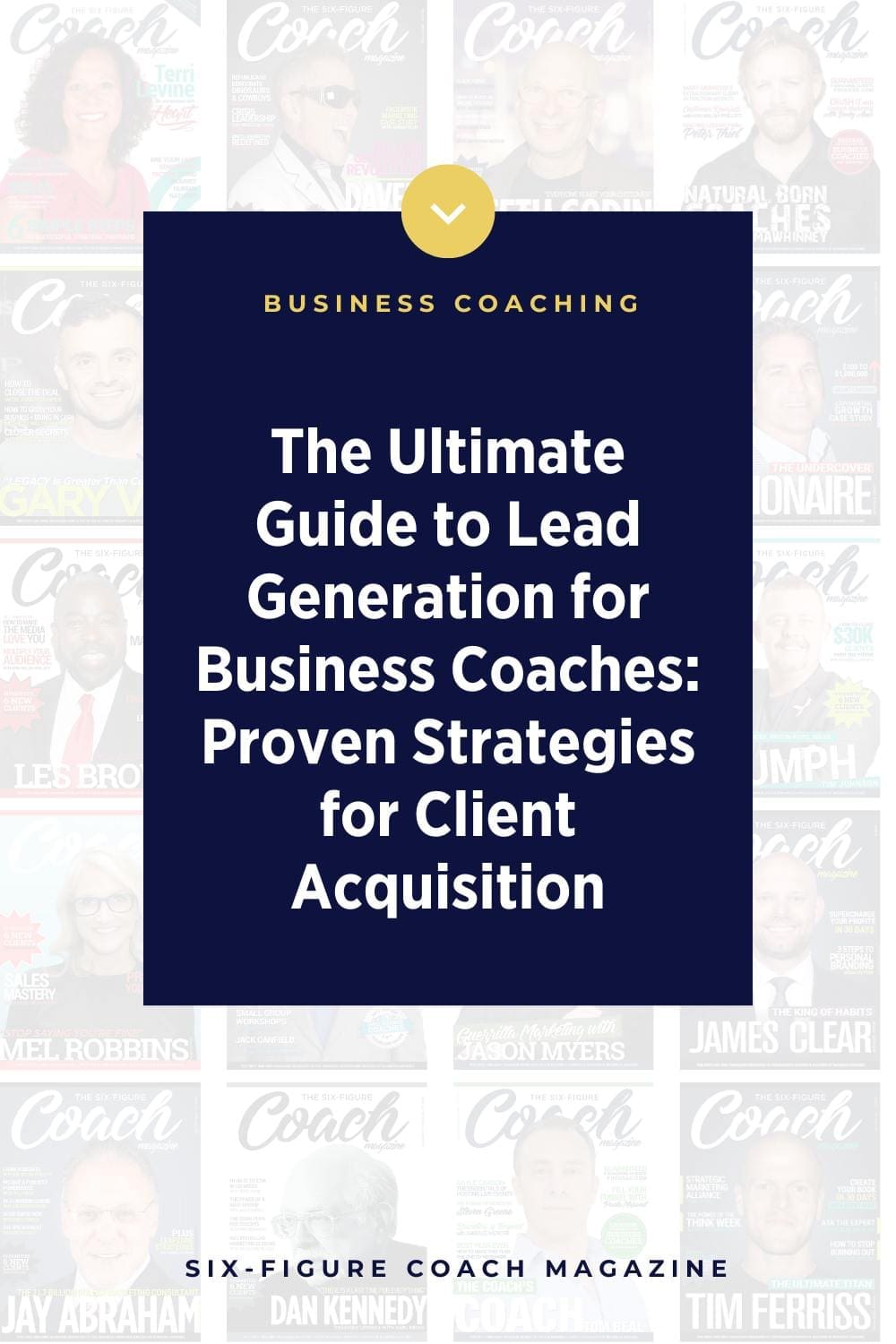The Ultimate Guide to Lead Generation for Business Coaches: Proven Strategies for Client Acquisition
Lead generation is key for business coaches to grow their practice. Without a steady stream of new clients, even the most skilled coach may struggle to stay afloat. This guide explores proven strategies to attract qualified leads and turn them into paying customers.
Effective lead generation allows coaches to spend less time chasing prospects and more time doing what they do best – helping clients succeed. Whether you’re just starting out or looking to scale an established coaching business, the right lead-generation tactics can make all the difference.
From optimizing your online presence to leveraging referrals, this guide covers essential techniques for coaches to fill their pipeline with promising leads. We’ll examine both online and offline methods to reach potential clients and nurture them through the sales process.
Understanding Lead Generation
Lead generation is crucial for business coaches to grow their client base. It involves attracting and converting potential clients into leads. Effective lead generation helps coaches fill their sales pipeline and scale their coaching practice.
The Basics of Lead Generation
Lead generation is the process of finding and attracting potential clients. It starts with identifying the target audience. Business coaches need to know who their ideal clients are. This helps them create tailored marketing messages.
There are many ways to generate leads:
- Content marketing
- Social media outreach
- Networking events
- Paid advertising
- Referral programs
The goal is to capture contact information from interested prospects. This often happens through lead magnets like free e-books or webinars. Once a lead is captured, it enters the sales funnel for nurturing.
Lead Generation in the Coaching Industry
Business coaches face unique challenges in lead generation. The coaching market is competitive. Coaches must stand out to attract clients.
Effective strategies for coaches include:
- Showcasing expertise through thought leadership
- Offering free discovery calls
- Creating valuable content that solves problems
- Building a strong personal brand
Trust is key in coaching relationships. Coaches should focus on building credibility and authority in their niche. This helps attract qualified leads who are more likely to convert into paying clients.
Online platforms like LinkedIn can be powerful tools for coaches. They allow for targeted networking and content sharing. Coaches can also use speaking engagements and workshops to demonstrate their skills and connect with potential clients.
Building Your Lead Generation Strategy
A solid lead generation strategy is key for business coaches to attract potential clients. The right approach helps identify ideal prospects, create compelling offers, and guide leads through the sales process.
Identifying Your Target Audience
Business coaches need to pinpoint their ideal clients. Start by creating detailed buyer personas. These profiles should include:
• Demographics (age, job title, industry) • Pain points and challenges • Goals and aspirations • Preferred communication channels
Research your target market through surveys, interviews, and competitor analysis. Use this data to tailor your marketing efforts and messaging.
Creating High-Quality Lead Magnets
Lead magnets are valuable free resources that attract potential clients. Effective options for business coaches include:
• E-books or whitepapers on business growth strategies • Free consultation calls or strategy sessions • Webinars or video tutorials on leadership skills • Self-assessment tools for business performance
Ensure lead magnets address specific problems your target audience faces. Make them easily accessible through your website and social media channels.
Crafting a Strong Unique Selling Proposition (USP)
A USP sets a business coach apart from competitors. To create a powerful USP:
- Identify your strengths and specialties
- Understand your target audience’s needs
- Highlight the unique benefits you offer
Your USP should be clear, concise, and memorable. Use it consistently across all marketing materials and client interactions.
Developing Your Sales Funnel
A well-designed sales funnel guides leads from initial awareness to becoming paying clients. Key stages include:
- Awareness: Attract leads through content marketing and social media
- Interest: Offer lead magnets and valuable information
- Consideration: Provide case studies and testimonials
- Decision: Present tailored coaching packages and offers
Use email marketing, retargeting ads, and personalized follow-ups to nurture leads through each stage. Track metrics to optimize your funnel’s performance over time.
Leveraging Content for Lead Generation
Content is a powerful tool for business coaches to attract and engage potential clients. By creating valuable resources and distributing them strategically, coaches can boost their visibility and credibility.
Valuable Content Creation
Business coaches should focus on producing high-quality content that addresses their target audience’s pain points. This can include blog posts, videos, podcasts, and ebooks. The key is to offer practical advice and actionable tips that showcase expertise.
Content topics might cover leadership skills, team management, or business growth strategies. Coaches can use real-world examples and case studies to make their content more relatable and useful.
It’s important to maintain a consistent publishing schedule. This helps build trust with the audience and keeps the coach’s brand top-of-mind.
Utilizing SEO for Organic Leads
Search engine optimization (SEO) helps content reach more people organically. Coaches should research relevant keywords their potential clients are searching for online.
These keywords should be naturally incorporated into content titles, headings, and body text. It’s also helpful to optimize meta descriptions and image alt tags.
Creating long-form content that thoroughly covers a topic can improve search rankings. Coaches should aim for articles of 1000+ words when appropriate.
Local SEO is crucial for coaches who work with clients in specific areas. They should include location-based keywords and create Google My Business profiles.
Benefits of Guest Blogging and Content Partnerships
Guest blogging allows coaches to reach new audiences and build backlinks to their websites. They should seek opportunities to contribute articles to respected industry publications or popular blogs.
When guest blogging, coaches should provide unique insights and avoid self-promotion. The goal is to offer value to the host site’s readers while subtly demonstrating expertise.
Content partnerships with complementary businesses can also be effective. This might involve co-creating webinars, ebooks, or video series. Such collaborations can lead to shared audiences and increased credibility for both parties.
Coaches can also invite guest contributors to their own platforms. This brings fresh perspectives to their audience and can lead to reciprocal opportunities.
Utilizing Digital Marketing Channels
Digital marketing channels offer powerful ways for business coaches to generate leads. These methods help reach potential clients and build relationships through online platforms.
Effective Email Marketing Strategies
Email marketing remains a top tool for lead generation. Create a targeted email list of potential clients. Offer valuable content like tips, industry insights, or free resources. Use catchy subject lines to boost open rates. Personalize emails with the recipient’s name and relevant information.
Segment your email list based on interests or needs. This allows for more tailored messages. Set up automated email sequences to nurture leads over time. Include clear calls-to-action in every email. Track open rates, click-through rates, and conversions to improve your campaigns.
Mastering Social Media Engagement
Social media platforms are ideal for connecting with potential clients. Choose platforms where your target audience spends time. Share helpful content regularly to establish expertise. Use eye-catching visuals like infographics or short videos to increase engagement.
Interact with followers by responding to comments and messages promptly. Run contests or giveaways to grow your follower base. Use hashtags to increase visibility. Join relevant groups and participate in discussions. Consider live streaming to showcase your coaching style.
Exploring Paid Advertising and SEM
Paid advertising can quickly boost lead generation efforts. Use Google Ads to appear in search results for relevant keywords. Create compelling ad copy that highlights your unique selling points. Set up retargeting campaigns to reach people who’ve visited your website.
Try social media ads on platforms like Facebook or LinkedIn. These offer detailed targeting options based on demographics and interests. Use A/B testing to optimize ad performance. Monitor key metrics like click-through rates and cost per lead. Adjust your budget and targeting as needed to maximize results.
Optimizing Conversions
Turning leads into clients takes strategic planning and ongoing refinement. Key tactics include creating focused landing pages, tweaking elements to boost conversion rates, and using data to guide improvements.
Designing Dedicated Landing Pages
Landing pages play a crucial role in converting leads. These pages should have a clear purpose and compelling call-to-action (CTA). Keep the design clean and uncluttered. Use headlines that grab attention and highlight benefits.
Include social proof like testimonials or client logos. This builds trust and credibility. Make sure the page loads quickly on all devices. A slow page can drive potential clients away.
Add a lead capture form, but don’t ask for too much information. Long forms can scare people off. Just collect essential details needed to follow up.
Conversion Rate Optimization Techniques
Boosting conversion rates requires ongoing testing and tweaking. Start by analyzing your current conversion funnel. Look for drop-off points where leads leave without taking action.
Improve your CTAs by using action words and creating a sense of urgency. “Sign up now for a free consultation” is more effective than “Learn more”.
Simplify your messaging. Focus on the key benefits you offer clients. Use bullet points to make information easy to scan.
Add live chat to your site. This lets you answer questions in real-time and guide leads towards conversion.
The Role of A/B Testing
A/B testing is a powerful tool for improving conversions. It involves creating two versions of a page or element and seeing which performs better.
Test one change at a time. This could be the color of a button, the wording of a headline, or the placement of a form. Run the test until you have enough data to make a decision.
Use the results to make data-driven changes to your site. Keep testing and refining over time. Small improvements can add up to big gains in your conversion rate.
Remember that what works for one business coach may not work for another. Your ideal clients and offerings are unique. Let testing guide you to the best approach for your specific situation.
Establishing Authority Through Personal Branding
Personal branding helps business coaches stand out in a crowded market. It builds trust with potential clients and shows expertise in the coaching field. Strong branding can lead to more leads and higher-quality clients.
Case Studies and Customer Testimonials
Case studies and testimonials prove a coach’s value. They show real results from past clients. Coaches should ask happy clients for reviews. These can be short quotes or longer stories.
Case studies work best when they follow a clear format:
- Client’s initial problem
- Coach’s solution
- Positive outcomes
Testimonials can be shared on websites, social media, and marketing materials. Video testimonials are very powerful. They put a face to the success story.
Free Consultations as a Lead Generation Tool
Free consultations let coaches show their skills firsthand. They give potential clients a taste of the coaching experience. This can turn curious leads into paying customers.
To make free consultations effective:
- Set a clear time limit (e.g., 30 minutes)
- Have a structured agenda
- Provide real value, not just a sales pitch
- End with a clear next step for interested leads
Free sessions also help coaches qualify leads. They can see if there’s a good fit before committing to a long-term relationship.
Building a Personal Brand via Social Media Platforms
Social media is key for building a personal brand. It lets coaches reach a wide audience at low cost. Each platform offers unique ways to connect with potential clients.
Tips for social media branding:
- Choose 2-3 platforms to focus on
- Post regularly (at least 3 times per week)
- Share valuable content, not just promotions
- Engage with followers through comments and messages
- Use hashtags relevant to coaching and your niche
Live videos and Q&A sessions work well on social media. They show a coach’s personality and expertise in real-time.
Tracking and Analyzing Lead Generation Efforts
Effective lead generation requires careful monitoring and analysis. Business coaches need to track their efforts, measure results, and make data-driven decisions to improve their strategies.
Importance of Analytics in Measuring Success
Analytics play a key role in assessing lead generation success. They provide insights into which marketing efforts are working and which need improvement. Coaches should track website traffic, conversion rates, and engagement metrics.
Tools like Google Analytics offer valuable data on visitor behavior. Social media platforms provide engagement stats. Email marketing software shows open and click-through rates.
By analyzing these numbers, coaches can spot trends and patterns. This helps them focus on the most effective channels and tactics.
Lead Qualification and Management
Not all leads are created equal. Coaches need a system to qualify and manage leads effectively. This process helps prioritize efforts and improve conversion rates.
Create a scoring system based on factors like budget, authority, need, and timeline. Use customer relationship management (CRM) software to track interactions and lead status.
Regularly review and update lead information. This ensures coaches focus on the most promising prospects. It also helps tailor follow-up communication for better results.
Adjusting Strategies Based on Data
Data analysis allows coaches to refine their lead generation strategies. By examining the numbers, they can identify what’s working and what’s not.
If a particular marketing channel isn’t producing results, it may be time to adjust or abandon it. On the flip side, successful tactics can be scaled up for better returns.
Test different approaches and compare results. This could include A/B testing email subject lines or trying new content formats. Use the data to make informed decisions about resource allocation and marketing spend.
Conclusion
Lead generation is key for business coaches to grow their practices. Effective strategies include networking, content marketing, and leveraging social media. Coaches should focus on building trust and showcasing their expertise.
Offering free resources like ebooks or webinars can attract potential clients. Personalized follow-up and nurturing leads over time is crucial. Tracking metrics helps refine lead generation efforts.
Coaches must stay consistent in their outreach and marketing. Building a strong online presence takes time but pays off. Referrals from satisfied clients are a powerful source of new leads.
The most successful coaches adapt their approach based on their target audience. They provide value upfront and demonstrate how they can help clients achieve their goals. With the right lead-generation tactics, business coaches can build a thriving practice.
You may also like
The Power of Small Wins: How Coaches Can Crush Overwhelm and Move Clients Forward
Discover how business coaches can leverage small wins to eliminate client overwhelm, build momentum, and drive profit. Actionable insights, examples, and a proven system—book a call to learn more.
Raise Your Bottom, Not Your Ceiling: The Game-Changer for Business Coaches
Discover why raising your bottom, not just your ceiling, can revolutionize your coaching business. Actionable insights & examples from Karl Bryan.
The 50 Ways Strategy: How Business Coaches Can Unlock Growth (and Their Own Confidence)
Discover the “50 Ways” exercise for business coaches to unlock client growth, boost your coaching confidence, and build a thriving practice. Action steps and real-world examples included.
